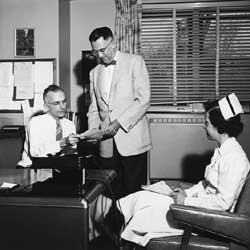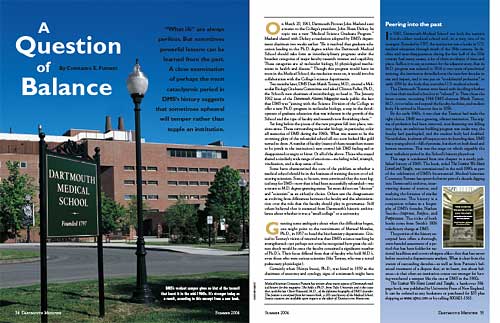Letters From Readers

We're always glad to hear from readers—whether it's someone weighing in with an opinion about an article in a past issue or someone wanting to be added to our mailing list to get future issues. We are happy to send Dartmouth Medicine—on a complimentary basis, to addresses within the United States—to anyone who is interested in the subjects that we cover. Both subscription requests and letters to the editor may be sent to: Editor, Dartmouth Medicine, One Medical Center Drive (HB 7070), Lebanon, NH 03756 or DartMed@Dartmouth.edu. Letters for publication may be edited for clarity, length, or appropriateness of the subject matter. |
Many of this issue's letterwriters weighed in on a feature in the last issue that explored a contentious period in DMS's past. But matters of more peaceable and present concern also caught readers' attention.
Positive ID
A Hanover High School classmate
sent me the article on page
16 of your Summer issue [about
the late Bill Wilson, longtime
administrator of Mary Hitchcock
Hospital]. I am sorry you did not
identify the other people in the
picture; the man standing next
to Bill Wilson is John Amsden,
my father, who was president of
the MHMH board and had been
instrumental in bringing Bill
Wilson from Pennsylvania to
Hanover. I think the picture was
taken in the early 1950s and
probably involved some negotiations
on obtaining the Marianne
Faulkner donation.
I just moved to Heritage Heights in Concord, N.H., and discovered Dr. John Lyle and his wife here, too. I worked on Desk 100 at the old MHMH during the winter of 1953-54 and knew Dr. Lyle then.
Kay Amsden
Concord, N.H.
We're delighted to have this additional information because the copy of the photo that we borrowed (reproduced at right) had no identifications on it except Wilson's.

This photo of the late Bill Wilson, left, struck a chord with a reader above. |
A champion of caring
The Summer Dartmouth Medicine
contains much on truly
caring for patients. Now that I
view the healthcare "system" as
a user and not a provider, I find
there's a lack of time for caring
by those giving care. When I've
been a patient, the warm blanket
after surgery, the treating of
parched lips with lemony glycerin,
and—luxury of luxuries—a
backrub were in that instant
more important to me than the
intravenous antibiotic.
The pressures of the business side of medicine tend to make the caregiver into a technician. When, as is the case in many managed multispecialty groups, the caregiver is reminded that he or she must increase production and see more patients, then the need to give less time per patient is obvious. Then the profession becomes just a job. This is a shame, but perhaps inevitable.
Thomas Huxley wrote that "All truth, in the long run, is only common sense clarified." Health care has become so codified, outcome-analyzed, and protocol- bound that it has lost sight of the rich common knowledge of its early teachers.
True, health care is a science. However, as Huxley notes, truth begins with commonsense observations. Plato's Republic wisely divides awareness into opinion and knowledge. Opinion comes from sense experience, and knowledge (science) comes from sense experience by means of reasoning. The two concepts are a whole and need each other. Sense experience can be somewhat mystical. I have always felt that skilled members of the health-care profession reach out with their self, their life force, to touch those they care for. It is my observation, after 35 years' experience, that this caring for the patient enhances the patient's confidence and healing.
Medicine will forget at its peril the essentials of caring for the whole patient. The rush to get the most for the least expense has led us away from many of the basics of good patient care. Thus my delight to see the thread of caring running through Dartmouth Medicine. Now just instill in your trainees a desire to keep this attitude that will overcome the insistent administrator.
Michael J. McKeown, M.D.
DMS '59
Hillsboro, Ore.

This feature was drawn from a recent history of DMS titled The Science We Have Loved and Taught. The book is available at www.upne.com or 800-421-1561. |
Comments on a cataclysm
I was glad to see that Dartmouth
Medicine published excerpts
from the chapter about
the molecular biology dispute of
the 1960s ["A Question of Balance,"
Summer 2004] in Constance
Putnam's recent history of
DMS. Constance did a spectacular
job of summarizing the cataclysm.
No one who was involved
will agree with all her judgments,
but we should appreciate her efforts
to be comprehensive and
fair to all sides.
Many of us on the faculty saw no conflict between participating actively in the Molecular Biology Program and being dedicated to teaching medical students— but, if anything, the sides were more polarized than she describes, the mutual incomprehension of aims and motives even deeper. Yet though I was a member of the faculty during that time, in daily touch with many of these events, this piece taught me much that I was unaware of. History owes Constance a big debt for elucidating so well our institution's past.
Allan Munck, Ph.D.
Norwich, Vt.
Munck is the Third Century Professor of Physiology Emeritus at DMS and has been a member of the Dartmouth faculty since 1959.
"Little med school that could"
The new history of DMS by
Constance Putnam—a chapter
of which was excerpted in the
Summer Dartmouth Medicine
—is wonderful!
I sat down with it intending to do a "heavy skim," as medical history is not a subject in which I have great interest. But I was totally sucked in; the book is very readable. Putnam included wonkish detail on administration and pedagogy, insight into the personalities involved, and tales of woe and celebration.
I found it all fascinating—due in part, no doubt, to the fact that I grew up in Hanover so know the place and recognized many names (but did not know they were so important!). In many ways, it is the story of a "little med school that could"; I never knew there had been so many times it might have died.
It was fascinating, though, to see how the Medical School has been hurt by small-mindedness, insularity, and incestuousness. Though we all celebrate Daniel Webster and his 1819 defense of Dartmouth College before the Supreme Court, there is the niggling thought that he may have done Dartmouth a disservice by limiting its self-image to that of an undergraduate institution.
I was also struck by how well Putnam calmly laid out the academic tussles, wading fearlessly into the various controversies over the centuries. She wrote about them in a way that was not alarmist, though at the time it probably seemed that the place was falling apart. What interested me was how similar academic fights are, no matter the century or the institution.
I cannot imagine all the material she had to sort through and understand and then figure out how to use, such as which of the smaller stories—examples of student life or research projects—to include. Another matter she handled well was following a theme through several decades, while never losing the story's basic chronological thread.
Throughout the saga, Putnam made the reader feel in good hands. She deserves kudos for crafting the best sort of institutional history.
Martha Scotford
Durham, N.C.
Scotford is a professor of graphic design and former associate dean for graduate studies and research at North Carolina State University's College of Design. In 1956, she moved with her family (including her father, the late John Scotford, DC '38) to a house that was adjacent to the then-new DMS campus in Hanover and that had been the home of longtime DMS anatomy professor Dr. Frederic Lord.
Eternal balancing act
I read "A Question of Balance"
by Constance Putnam with great
interest. A physician-educator, I
am quite intrigued by medical
history.
When I was an undergraduate at Dartmouth College in the early 1970s, I was privileged to know Dr. Carlton Chapman [then the dean of DMS], a great arbitrator who later became the director of the Commonwealth Fund and was also associated with the World Health Organization. Some of the issues that Putnam discussed in her article certainly have global as well as academic implications.
Dartmouth Medical School's move toward interdisciplinary excellence as described in Putnam's article was facilitated by considering finite academic resources. The same considerations must be taken into account whenever one wishes to create truly beneficial international and cross-cultural coalitions.
One institution in particular, Duke University School of Medicine, had the resources to develop M.D.-Ph.D. programs years ago, under the direction of Dr. Eugene Stead, another fine arbitrator. Scientific interdisciplinary programs like this constitute an optimal approach to medical scholarship. Such programs should be well-timed in an academic environment, where prioritization takes on special meaning. And Dr. Stead, like Dr. Chapman, was also later associated with the Commonwealth Fund.
Furthermore, Duke Medical Center's Dr. Andrew Wallace, a protege of Dr. Stead's, served as the dean of Dartmouth Medical School from 1990 to 1998.
Dr. Chapman believed, as did Dr. Stead, that medical school graduates (M.D.'s) can benefit from an academic environment in which they experience input from scientists (Ph.D.'s) who are used to challenging minds.
As a clinically challenged devotee of both Dartmouth's and Duke's medical enterprises, I agree wholeheartedly with Constance Putnam. Whether one is working as a practitioner treating patients in the cold north, the sultry south, the expansive west, or the multiethnic east, one should always consider medical education as a complicated "question of balance."
Robert L. Bloomfield, M.D.,
DC '73
Winston-Salem, N.C.
Bloomfield is director of the Evergreen Health Promotion Clinic in Winston-Salem and an assistant clinical professor at Wake Forest University Medical Center.
Dramatic transformation
For those of us who have spent
our professional lives as partners
in the nation's health-care system,
current developments in
the DMS curriculum are a dream
come true.
To see doors opening to an expanded awareness of community— with expanded opportunities for interprofessional communication and cooperation— makes me appreciate more than ever that I was given a chance, as the first nurse on the DMS faculty, to be part of this vital effort. Looking back, I take my hat off to the visions of Dr. Thomas Almy, Dr. Saul Blatman, and so many others. Now, I happen to be particularly aware of the work of Drs. Paul Batalden and Joe O'Donnell. In March, I attended a conference organized by Dr. O'Donnell, "Doing Good Work in Medicine: Where Excellence and Ethics Meet"—words that echo, as Constance Putnam put it in her recent article for Dartmouth Medicine, "the dramatic transformation of the Dartmouth medical enterprise in recent decades."
Frances W. Field, M.N., R.N.
Lebanon, N.H.
Field is an assistant professor of pediatrics emerita at DMS.
Site reader
Would you please send me a
copy of the article "Going
Home" by Emily Transue, M.D.,
published in the Fall 2000 issue
of Dartmouth Medicine? I see
it listed on your Web site, but the
article is not available there. Dr.
Transue is my physician, and I
was thrilled to see that she has
just written a book. She's an outstanding
doctor. Many thanks.
Gwyneth Jones
Bellevue, Wash.
Most of our articles from recent years are at http://dartmed.dartmouth.edu/. However, we are sometimes not able to get permission to post content from the print edition online, as was the case with this article. That's because it's part of a new book of short stories by Transue that St. Martin's Press just published— from which, in fact, one of this issue's features was excerpted. But if an article from a back issue isn't available online, we're happy to send a copy by snail mail.
Patient praise
Just wanted to thank you for the
great article on Dr. Stanley van
den Noort. I am one of his numerous
multiple sclerosis patients,
and all of us think he is a
saint. For his sake, we wish he
would retire. For his patients'
sake, we hope he lives forever.
Chris Mandala
La Verne, Calif.
Van den Noort was profiled in our Winter 2003 issue. A 1952 DMS graduate, he is one of the country's foremost authorities on multiple sclerosis and is on the faculty at the University of California at Irvine.
Survivor of "the San"
My son, who works at DHMC,
gave me a copy of the Summer
2003 Dartmouth Medicine so I
could read the feature "Mountain
Aerie"—since I was a patient
at Glencliff Sanatorium.
I had a sister and brother die
of TB at "the San": the gold
treatment failed them. I was
lucky: with the discovery of paraaminosalicylic
acid, streptomycin,
and isoniazid, plus lung surgery
at New England Deaconess
Hospital, I was a survivor.
The feature was well written and brought back both good and bad memories. I was refused a job in a store in Littleton when I was asked where I had worked last and I said Glencliff; imagine what that does to a person.
I also enjoyed the articles in the same issue about Dr. Robert Christie's pathology career in the North Country and Dr. Robert Drake's work on mental illness and substance abuse.
Irene B. Lynde
Littleton, N.H.

Be sure to tell us when you move! If your address changes and you want to keep getting Dartmouth Medicine, just tear off the address panel from the back of a recent issue, write your new address next to the old one, and mail it to: Dartmouth Medicine, One Medical Center Drive (HB 7070), Lebanon, NH 03756. It helps us greatly—since our mailing list is drawn from six separate databases—if you send the actual cover or a copy of it. If that's not possible, please include both your old and new addresses. Note, too, that if you receive more than one copy of the magazine, it's because of those six databases (which are in different formats, so they can't be automatically "de-duped"). We're happy to eliminate duplications, but it's a help to have the address panel on all the copies you get, not just the one(s) you'd like deleted. |
Surgical connections
What a pleasant surprise it was
to read about Dr. Ralph Alley in
the "Faculty Focus" profile of Dr.
William Nugent in your Summer
issue. Dr. Nugent referred to Dr.
Alley as "charismatic," to which
I can attest. Dr. Alley was an assistant
professor of thoracic surgery
at Albany Medical College
when I was a student there. I remember
well how he brought in
a working model of the DeWall-
Lillehei bubble oxygenator one
day in 1955 or 1956 and told us
about the exciting work taking
place out in Minneapolis, where
open-heart surgery was then being
pioneered.
Little did I realize that just five years later I'd be a surgery resident at the University of Minnesota, working on Dr. Lillehei's service and running that "Model-T" machine. It was literally made from laboratory parts —Mylar tubing, metal sponge cans, sterilized and siliconized Chore-Girl sponges, and a Sigmamotor pump with metal fingers that "milked" the blood back into the body.
Patients' "pump" time had to be limited to two hours or less, but it did allow heart surgery in a bloodless field, something unheard of just a few years before.
Although I didn't stay in cardiothoracic surgery, Dr. Alley was one of those who piqued my interest in the surgery program in Minnesota. It is no surprise that he went on to be chief of cardiothoracic surgery at Albany Medical College.
David L. Siegal, M.D., M.H.A., DC '53
Carmel, N.Y.
Home delivery
I am a former MHMH employee and always
looked forward to reading Dartmouth Medicine.
My husband is a faithful blood donor
at DHMC and whiles away his appointments
reading the magazine. We'd appreciate being
able to read it at home, too. Would you
please add us to your mailing list?
Diane Burrows
South Reading, Vt.
Moving on
I was an R.N. for 19 years at MHMH and always
enjoyed reading Dartmouth Medicine.
I now live in North Carolina and
would appreciate being on your mailing list.
Sue Broderick
Hendersonville, N.C.
If you would like to offer any feedback about this article, we would welcome getting your comments at DartMed@Dartmouth.edu.
